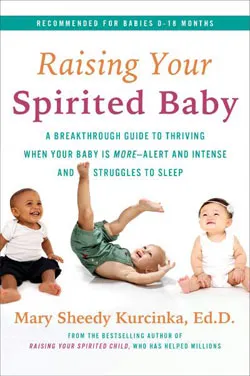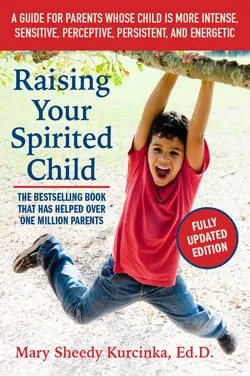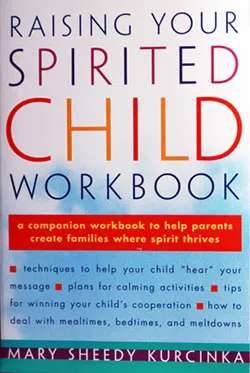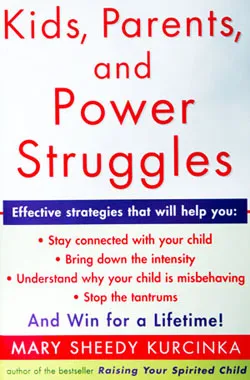CHAPTER 1.
WELCOME TO MORE…SPIRIT, CRYING, FUSSING, GIGGLING, GUILT, AND STRUGGLES TO SLEEP
The Joys and Challenges of Raising a Highly Alert, Intense, Spirited Baby
“My daughter entered life like a warm and gentle shower.
My son began his life like a raging thunderstorm.”
--John, father of two
If at your childbirth class reunion, you found yourself holding your baby in the back of the room, dipping into deep-knee bends in the hope of preventing him from becoming a roaring lion while every other baby laid oh-so-placidly on the floor, you are likely the parent of a spirited baby. Spirited infants are the outliers – the exceptions to the rules, the extraordinary ones. As we will see, spirited infants are normal but somehow...more.
When you hear other parents extol how easily their babies sleep and feed, you cannot help thinking they are lying. Getting your baby to sleep is a wrestling match, requiring 45 minutes of bouncing, singing, shushing, and swaying only to have your bundle of joy wake minutes later. You want to scream, “This is NOT the baby I expected.”
Yet there is something about this child that delights you, draws you to her, and wraps around your heart. You sense her intensity--a spirit so palpable that the delivery room nurses commented about it and wished you luck. The power of her gaze is irresistible. Even strangers remark about how alert she is. You love her so much but…
You are probably exhausted, likely to have gone longer without sleep than a Navy SEAL in training! You are certainly weary of hearing success stories that seem so foreign to you and unattainable. Do babies really just fall asleep anywhere? Do they really take to new foods, people, and places with ease? Do they really remain calm while riding in their car seat or while tucked into a stroller in the middle of a busy restaurant or store?
If you have another child, a non-spirited one, you know the answer to these questions is a resounding yes. But now, since your spirited one arrived, you may have lost your confidence. You may find yourself questioning your abilities as a parent and possibly crying every day. If this is your first child, you may wonder why it feels like you are failing when you are trying so hard.
I am here to tell you: You’re not failing at anything! Your actions do not make your baby spirited. You are not doing something wrong. You are not lacking some magical touch that other parents seem to have.
I am here to tell you: You’re not failing at anything! Your actions do not make your baby spirited. You are not doing something wrong.
Nor are you alone. Worldwide it is estimated that spirited infants make up 20 to 25 percent of all full-term babies. That is one million babies born every year in the United States alone. You are not the only one with a baby who sends your partner to the couch, leaving you alone to cry. You are not the only one whose dream baby was dropped off at your best friend’s house and instead you were given this special little one—a pure delightful package, but oh so exhausting. You are not the only one to find yourself panting, and at times gasping, to catch your breath.
Spirited infants arrive in this world genetically wired to be highly alert and intense. It is not your imagination that your baby’s shrieks are more piercing or that you are working harder. Raising a spirited baby does take more time, skill, and perseverance—and, I would say, more knowledge—and yet almost no one talks about it.
Every year 20 to 25 percent of all babies born are spirited... Spirited infants arrive in this world genetically wired to be highly alert and intense.
YOUR BABY’S INNATE AROUSAL SYSTEM
It is easy to think the problem is you. But it’s not. It’s all about biology. Spirited infants who can rocket from quiet and calm to red-faced and screaming in seconds are genetically wired with a more reactive arousal system.
The arousal system is the body’s built-in wiring that regulates our fight, flight, or freeze responses, energy levels, sleep cycles, digestion, heart rate, breathing, and attention. Like a command center, it lies within our brains, scanning our environment and absorbing everything that is going on around us. When our arousal system perceives anything new or different—any change, any surprise—it sends a signal to the body’s biological systems: “Pay attention! Be on alert for potential danger.”
When a possible threat is detected, the control center calls for a burst of energy, speed, and strength, telling us, “Gear up! “Be ready to fight, flee, or freeze!” It then accelerates the heart, pulse, and breathing rates, increases blood flow to our muscles, and shifts our focus to the threat at hand. If the information is unimportant and can be ignored, our biological systems are directed to idle in a balanced, quiet state. This ability to accelerate or slow our biological reactions according to the needs of the situation is called “self-regulation.”
Your baby’s spirited arousal system is apparent when:
- Your baby bursts into tears while another baby in the same situation sleeps soundly.
- The strategies your friends swear by do not work with your baby.
- It is nearly impossible to lay your baby down because the moment you lean forward, she startles herself awake.
- At 10 months old your baby is “emptying” the dishwasher, finding his own snack in the pantry, and already refusing to take “no” for an answer.
- The upsets and shrieking come out of seemingly nowhere and take forever to subside.
The arousal system of these babies is set to trigger faster and calm more slowly. At any given moment, a spirited baby, compared to an “easy” baby, is in a state of heightened awareness and reactivity.
While everyone has an arousal system—babies, children, and adults alike--there are stark individual differences in how our systems are calibrated. We vary widely in the amount of information it takes to trip our control center’s threat response and how swiftly our biological systems jump into action. Think solid Subaru versus high-strung Lamborghini. (Both are great models, just different.)
To see these differences in action, meet Hannah and Jordan.
TJ and Meg were dining at a restaurant with their three-month old twins. Hannah and Jordan lay contentedly in their infant seats until a waiter accidently dropped a tray, sending glasses and dishes crashing to the floor. Hannah gazed toward the noise, casually searching for the source. Jordan erupted in a fire-engine wail. His body flailed, nearly flipping him out of his carrier. TJ immediately picked Jordon up to calm him, but he continued to shriek, forcing TJ to abandon his food and dart for the door to help Jordon settle down. Despite the ruckus, Hannah fell asleep.
Same place, same parents, same ages, so why such different responses? At three months of age, Hannah and Jordan’s polarized reactions are not learned, but reflect the differences in their genetic wiring. Hannah, who merely gazed about the room after the dishes crashed, was born with a low-key arousal system. It requires a formidable amount of stimulation to activate her system. When a source of stimulation does become overwhelming, she is able to withdraw her attention and switch to sleep. Jordan, on the other hand, arrived with a highly reactive, spirited arousal system. A mere click of the car seat buckle can trigger a response, much less the explosive sounds of breaking glass. Once upset, Jordan remains upset longer as well.
If we had a monitor to measure their responses, we would see that Jordan’s heart and pulse rates were racing in comparison to Hannah’s slow steady beats. His pupils would be dilated wider, his vocal cords tighter, and his stress hormone levels elevated higher. On any given day Hannah’s arousal system may not even become physiologically elevated by stimulation that overwhelms Jordan. Jordan experiences every sensation to a degree that is bigger, louder, higher, faster, hotter, and more penetrating. His keen attentiveness is an asset that can lead him to excel, but it also means that Jordan requires greater sensitivity, courage, and support from his caregivers. This is especially true in his early months and years as he develops the skills to manage his arousal system and settle at the level of arousal that fits the situation.
Spirited infants are defined by their highly reactive arousal systems. That is why spirited babies, unlike their low-key counterparts, need extra amounts of attention, touch, and assistance to calm themselves.
Through our support, spirited babies are given the opportunity to rehearse and practice the process of regulating.
Spirited infants are defined by their highly reactive arousal systems. That is why spirited babies, unlike their low-key counterparts, need extra amounts of attention, touch, and assistance to calm themselves.
THE SENSITIVE, RESPONSIVENESS
APPROACH TO THE SPIRITED BABY
Understanding the arousal system helps explain why the right response for the spirited baby often runs contrary to traditionally recommended practices, especially those that encourage ignoring a baby’s crying or not responding quickly. Rather than creating a “bad habit,” our warm responses change the wiring of their brains. New neural connections form. The babies gradually gain the strength and finesse to smoothly downshift and accelerate their finely tuned engines as needed. Working with their arousal system instead of against it changes everything.
Typically, babies with every kind of genetic makeup are lumped together in the advice from the doctors, psychologists, and parenting experts who say:
“This is how to get your child to nap.”
“This is how to deal with crying.”
“This is how you get your baby to sleep at night.”
However, their caveat--their truth in advertising--is the little phrase you’ll find tucked into the introductions to their books or talks:
“this does not work for every baby.”
No explanation is offered, and no effective alternative strategies are provided. Yet, as far back as the second century, Galen, a Greek physician, surgeon, and philosopher argued, “Children differ from one other from the earliest days.” These differences cannot be discounted. One size does not fit all.
Unlike experts and methods that ignore, minimize, or even disparage the unique needs and gifts of spirited babies, Raising Your Spirited Baby addresses them head-on with a new set of principles:
- Awareness and sensitivity to the baby’s cues—whenever possible “catching” and calming the baby before the arousal system accelerates to an overload level.
- Immediate responsiveness to the baby—providing what this baby needs in ways that calm and comfort the baby and the parents.
- Support and caring for everyone—baby, parents, the whole family.
- And gradually bringing the baby into the family’s system—using simple, sensitive techniques to meet the baby’s needs while simultaneously gently nudging the baby into the rhythm and routine of the family.
These are the hallmarks of the Spirited Baby Method—a clear, shame-free, guilt-free approach for parents of babies from birth to 18 months of age.
Is This Book Really for Me?
While not every baby is spirited, many babies will have some spirited qualities and every parent experiences spirited baby moments. To help you see how you’re managing and handling the stress, the Parent Self-Assessment is a quick shortcut. If you score 8 and above, be assured that you are among friends and you’ll get the help and support you need. If your score is lower, you belong here, too! All the insights and practices in this book will help you be the sensitive, responsive parent you want to be while supporting you on your parenting journey.










